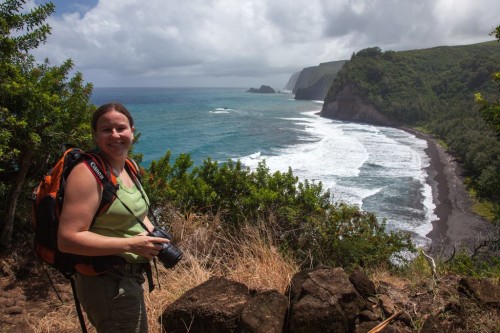- Date: 14 Apr 2017
- Comments: (0)
- Categories: For Everyone
Get to Know Gemini is a new series of blog posts aimed to highlight the different careers, backgrounds, and types of people contributing to Gemini Observatory and its science.
Name: Kathleen Labrie
What is your current position and at which telescope?
Observatory Scientist working in the Science Users Support Department based at the Northern Operations Center in Hilo, Hawaii.
In four lines or less, explain what you do as part of the Gemini Observatory team?
Most of my time is spent coordinating the development and maintenance of the data reduction software suite. I also code a bit, write documentation, do quality assessment, help users, support some internal software. And I do astronomical research too.
How long have you worked for Gemini?
13 years
What drew you to this job?
During the PhD, I realized that I really liked the technical aspect of astronomical research, especially the software development (coding) aspect. Playing with data through software while serving our users is the main appeal of the job for me.
What is the best part of your job?
Coding. Debugging software, finding the source of mysterious behavior, can be as fascinating as it can be frustrating. At the end there’s this “Ah! ah! Got you” moment that can be very rewarding. Basically, it all comes down to problem solving, whether it’s debugging or coding new stuff.
Where are you originally from/where did you grow up?
Born and raised in Rouyn-Noranda, Québec, Canada. A small town 8-hour drive from Montréal. A land of endless forests and countless lakes. Beautiful.
What skill do you think is most important to know for your job?
I would say that a good balance of pure logic and intuition is important. Both are essential to problem solving, especially when it comes to data processing and software. They help me target the root cause of a problem efficiently and correctly.
Why is astronomy important?
Astronomy is a great gateway science to get kids and adults alike interested in science and technology.
In three lines, explain your PhD thesis.
I developed a technique to use near-infrared emission lines from supernova remnant shells to estimate supernova rates and the impact of supernova activity on starburst galaxies.
What are your current research interests?
I am still highly interested in my research project, however I have not been able to work on that for years. These days I am part of a team that studies the broad emission line regions of quasars (the region just beyond the accretion disk.) We are trying to estimate the mass and size of the quasars, and how things move in there.
What is your favorite movie?
The Godfather. I’m still undecided whether I prefer the first or the second movie.
What is the latest book you have read?
Winter Men. It follows two German brothers during WWII. Beautifully written, and translated (from Danish). Beware, not a cheerful story.
What three albums would you bring with you to a desert island?
I don’t listen to music much anymore. It’s a bit strange. Pink Floyd’s The Wall would have to be one of the three. It is possibly the only album I never get tired of. Then Jean-Michel Jarre’s
Oxygène, and a recording of Mozart’s Requiem.
What is one hobby of yours?
Geocaching, which can be defined as “Using multi billion dollar military defense satellites to find tupperware in the woods.” We use GPS to find small containers hidden by other geocachers, just for fun. Check it out at geocaching.com.
Favorite beverage?
Hendrick’s Cucumber Martini. Crush a couple slices of cucumbers, add gin (Hendrick’s, it has to be Hendrick’s), a bit of dry vermouth, ice. Shake and pour in martini glass. Heaven.
Check back next month to learn more about the staff that help Gemini to explore the Universe and share its wonders!






